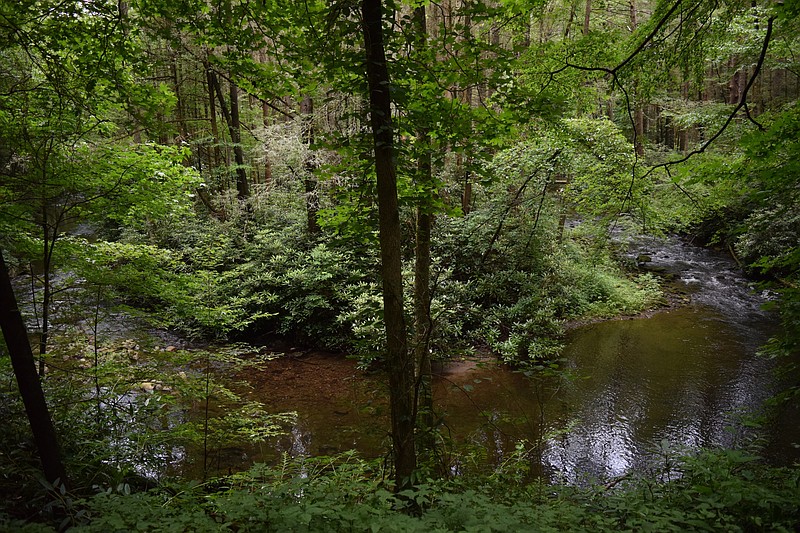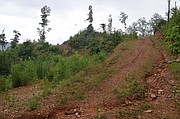Photo Gallery
Opponents of controversial timbering site in Polk County, Tenn., stymied by federal response
A Cherokee National Forest supervisor has said federal officials will not consider objections to a controversial timbering project in Polk County, Tenn., near Tumbling Creek along the Tennessee-Georgia line.
Chattanooga resident and conservationist Davis Mounger is fuming.
Mounger is the coordinator for Tennessee Heartwood, one of the entities that raised concerns earlier this year about timbering operations on the steep, concave incline near the stream and the potential for environmentally damaging runoff and soil erosion. Besides Tennessee Heartwood, the Tennessee Chapter of the Sierra Club opposes work that opponents contend could harm the environment.
Opponents fear logging the slopes of what is called the "Dinkey Timber Sale" - hundreds of acres of land with a mix of trees and other fauna, some of it naturally occurring and some of it species that ordinarily would not grow there - will end up looking like some other past timbering sites where topsoil has eroded down to the chert layer and where little remediation has taken place. Parts of the Dinkey project are near Tumbling Creek, which flows through the Cherokee National Forest between Big Frog Mountain and Copperhill, Tenn.
Dinkey timber sale
Tennessee Heartwood, a nonprofit group that advocates for Tennessee’s public forests, describes the current work proposed for the “Dinkey Sale” located in Polk County, Tenn., near the Georgia border.› 230 acres of clear-cuts, shelter-wood cuts, and seed-tree cuts with burns and herbicides› 356 acres of mid-story thinning with burning and herbicides› 444 acres of “cut-and-leave” mid-story thinning› 734 acres of prescribed burning that alternate between dormant and growing season burns between two to five years› 32 acres of noncommercial thinning› 75-acre “extended stream side management zones” for logging of 50 percent of the canopy along Tumbling Creek. This will be the second-tier buffer strip between the creek and the heavy logging along the slope.› An old logging road will be reactivated across Tumbling Creek at one point, where a deposit of Anakeesta Shale is located. Anakeesta Shale is known to cause acid rock damage where roads have been cut in the past.› Some of the slopes that will be logged exceed 35 percent in steepness and are highly susceptible to runoff, erosion and compacting from logging equipment.Source: Tennessee Heartwood
Cherokee National Forest supervisor JaSal Morris late last month announced he will not consider the groups' objections to the project that were filed in July, Mounger said.
In an Aug. 25 letter to a coalition of conservation groups that includes the Sierra Club and Tennessee Heartwood, Morris said that the groups' objection "does not provide sufficient information for the reviewing officer to review."
Morris cited a failure by the objection to outline forest laws or policies that were being violated and failure to demonstrate a connection between the groups' objection and its earlier comments.
Morris' review of the objection means opponents have reached the end of the road as far as finding a willing ear among federal officials.
Mounger finds the letter "appalling."
"Our concerns about this project haven't been a secret," Mounger said in a statement about the decision. "We've been raising them over and over again for over three years, with pictures and data. Despite those comments and meetings, the Forest Service didn't tackle the problem - namely, that similar projects on similar soils and slopes have caused a lot of damage to the soils, waters, and forests."
Federal officials responded Friday to a Times Free Press inquiry on Dinkey.
"The offering of timber sales is part of our restoration efforts. The primary purpose is not solely to generate revenues, [although] timber harvesting can be a benefit to local economies. Timber harvesting is one of several tools used to restore areas to a more natural state," the response states. "The Forest Service has increased awareness and focus on ecosystem restoration. Restoration increases resilience to ensure these systems are able to thrive and adapt to changes. Healthy resilient forests provide clean water, carbon sequestration, habitat for fish and wildlife, forest products and opportunities for outdoor recreation."
Federal officials said Tumbling Creek does not face any impact from the planned timbering project.
"The Dinkey project does not have any harvesting activities along Tumbling Creek," the response states.
But opponents point to federal documents that show there will be logging work very close to the stream, if not on its banks.
"[A]long the corridor closest to the stream, they'll be cabling trees and leaving about half," Mounger said. "Once outside of that corridor on the slope, it goes to the more intense clear-cuts, shelter-wood, and seed-tree cuts [with] heavy machinery allowed. So basically, there is logging along the corridor, with increasing intensity as you go up the steep slopes."
Mounger said the Forest Service is ignoring data from its own soil analysis and problems with at least one other timber project - the Island Creek/Hogback timbering site on Slyco Ridge in Polk County south of Lake Ocoee - that were part of the contents of the objection that was filed.
The soil data "showed higher disturbance than was acceptable at some units of the Island Creek sale, but this unit is not part of the Dinkey Project," the federal response states. "We have started additional rehabilitation efforts with various treatment options to develop a mitigation plan based on our findings to be implemented on units that are outside of our soil disturbance threshold. The best mitigation results will be utilized throughout the Dinkey Project."
Opponents remain unimpressed.
"Now here we are again, at the formal objection process, and the problem is still being ignored," Mounger said. "By failing to address our concerns, they are showing that they either don't know how to prevent this damage from happening again, or that they simply don't care enough to engage with the public about it."
Axel Ringe of the Tennessee Sierra Club, a group that has worked to protect soil and water on the Cherokee National Forest for decades, said the decision could set a "bad legal precedent.
"We have made a good-faith effort to outline specific issues consistently, only to have the agency claim arbitrarily that we haven't. This would, in my opinion, really have a chilling effect on the public's right to participate in the management of their national forests."
Mounger said Dinkey's opponents are "exploring legal options," and noted that the forest service has said it will begin implementation of the timber sale project sometime next year.
Contact staff writer Ben Benton at bbenton@timesfreepress.com or 423-757-6569. Follow him on Twitter @BenBenton.

